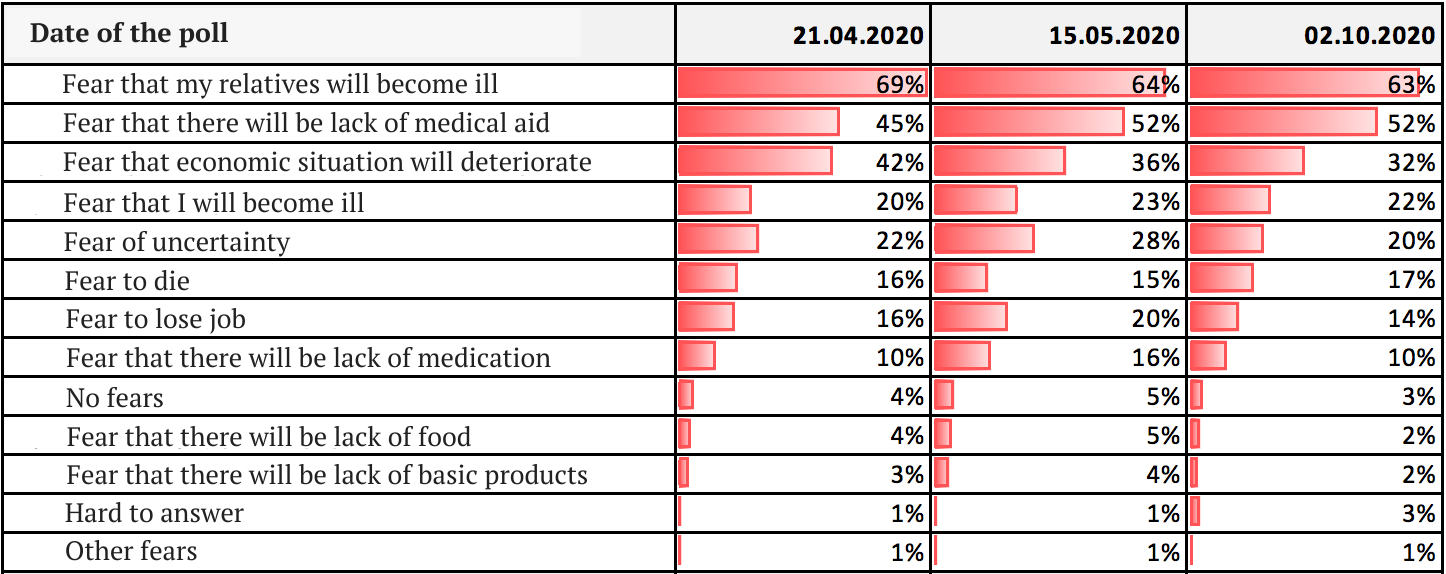The new Ukrainian poling platform Gradus Research has conducted a comprehensive study of social stress during quarantine. Since May 2020, the company has been monitoring the stress level of Ukrainian citizens in the new realities on a monthly basis. Overall, social stress became two to three times more frequent in 2020. The poll discovered that sex, age, and financial status are important factors that determine how stressful the experience of lockdown is.
Gradus is a new platform for conducting quick sociological polls using a special mobile application. Surveys are conducted in accordance with sociological standards among verified respondents of the Gradus panel. The technology enables conducting representative national questionnaires in the space of several hours. The platform automatically renders results according to the respondents’ age, gender, size of settlement, and region to make the results representative.
The measurement of the level of stress was conducted according to a questionnaire with a scale consisting of 10 questions to determine how stressful people consider their lives. The questionnaire was designed by Oleksandr Vynogradov, member of the Gradus Advisory Board and PhD of Psychological Sciences at Kyiv National University.
The poll determined the very high level of social stress reported by the respondents according to their 10 answers – 78% out of 100%. It was at its highest in June, with 81% of respondents feeling stressed due to lockdown or other governmental restrictions and remains almost unchanged today.
Compared to men, women feel social stress almost 10% more strongly due to the situation with quarantine restrictions and COVID-19.

Among different age groups, young people aged 18-24 also have an 8% higher level of social stress: it was recorded in the answers of 86% of young respondents. Such results are primarily related to financial issues, job losses, family problems.
“Since May, we have seen that women and young people experience more stress than other groups. In addition to the fact that women are usually more sensitive, and young people are experiencing their first full-scale crisis, there is another important factor that increases stress in these groups. The fact is that the corona crisis is also a crisis of socialization. Restrictions in personal communication with peers (for young people) and in communication in principle (for women) are a significant limitation of positive emotions – and therefore a serious factor increasing stress. Unfortunately, until the fears of infection are removed, I think this situation will persist,” said Yevhenia Blyzniuk, CEO & Founder of Gradus Research.
What are the strongest fears?
Paradoxically, the fear of being infected was the highest (about 50%) in January-February 2020, when there were as yet no COVID-19 cases detected in Ukraine, but media reports about the pandemic were generating panic. In some cases, it led to protests against the planned evacuation of Ukrainians from China – the manifestation of foolishness created by Russian-related media reports and posts in social networks, looking from today’s perspective.
Since May, when many real coronavirus cases were detected in Ukraine, fear of the illness has declined and has been stable at about 20%. At the same time, the self-evaluated probability to contract COVID-19 increased.
Thus people became much less afraid when facing the actual illness than when watching and listening distant media reports from other countries.

Yet this trend does not apply to the fear that close relatives may become ill, which was and remains the main fear related to the pandemic. Since May has it declined very slightly, from 69% to 63% of respondents reporting they are afraid of their relatives becoming ill.

The second and third most frequent fears are an absence that they will receive adequate medical help, as well as that the economic situation will deteriorate.
When asked to compare what is scariest for them – the virus or the possible income decline – respondents tended to put the virus first at the beginning of the pandemic, while later it was fears related to the economic situation that strongly prevailed. It was observed in the last month though that the fear of the virus itself had again increased, likely due to the high number of new cases reported in Ukraine. As of today, people are equally frightened of the virus and falling incomes.
Regarding government measures aimed at preventing the spread of the virus, people are rather skeptical. Although at first the majority partially supported the government’s actions, the dynamic was radically negative. As shown in the graph below, currently 40% of respondents consider government restrictions as rather ineffective and another quarter of respondents radically oppose government actions.

Read also:
- Interactive COVID-19: Ukraine and world
- Third recession in ten years — the impact of COVID-19 lockdown on Ukraine’s economy
- “Church restaurants” pop up as weekend quarantine deepens COVID-19 double standards in Ukraine
- Ukrainian mayors rebel against COVID-19 restrictions and win
- Art lovers recreate Ukrainian masterpieces in COVID-19 confinement

